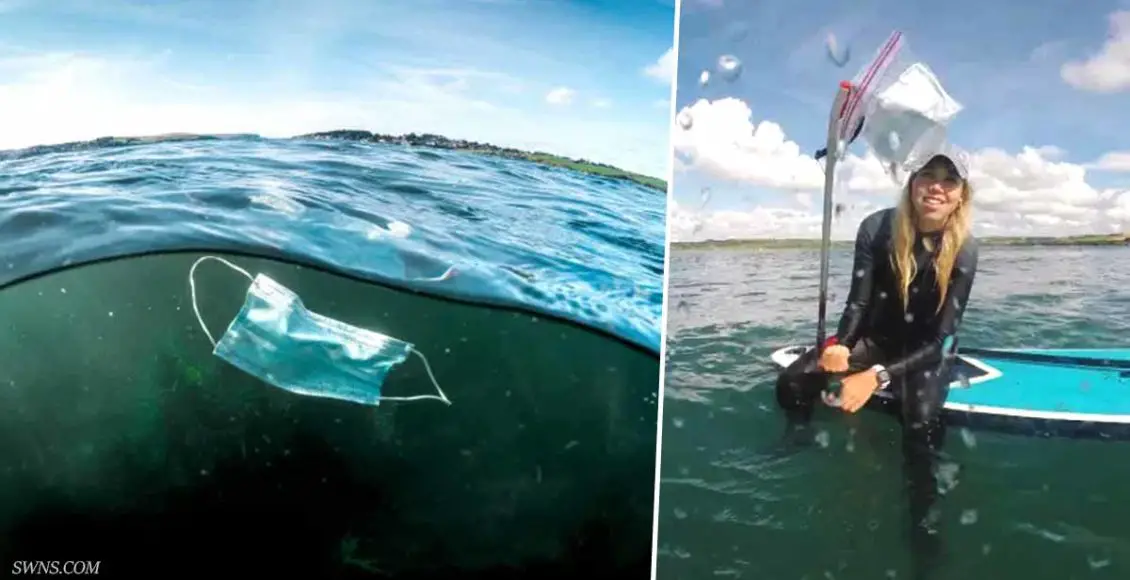194 billion PPE pieces used monthly spark fears of a massive wave of pollution in the oceans

A new wave of pollution hits the oceans as millions of PPE pieces are being discarded in the waters.
As the world is suffering a global coronavirus pandemic, wearing face masks and gloves has become a much-needed preventive measure in many countries. Unfortunately, while protecting themselves from the virus, people are now polluting the oceans and beaches by improperly discarding their disposable protective equipment.
😷 !THE PLASTIC PANDEMIC! 😷
🌊We are constantly warned of a 'second wave', and yet, a new plastic tide has already risen…
🏄🏼♀️ We recently headed out for a #PaddleForPPE. After the first 5 minutes, we found a face mask in the water.
📸 Alex Stevenson – By The Compass pic.twitter.com/qlyQFZHCFW
— Beach Guardian (@PlasticWaive) August 5, 2020
A recent study published in the Environment, Science & Technology journal states that people are using a total of 194 billion units of PPE per month, which results in ‘widespread environmental contamination’.
What’s even worse, in an official report earlier this year, the World Wildlife Fund(WWF) stated:
“If only 1 percent of the masks were to be disposed of incorrectly and dispersed in nature, this would result in up to 10 million masks per month polluting the environment.”
The UK-based marine biologist Emily Stevenson, also known as the ‘Beach Guardian’, has recently found a massive amount of discarded PPE along England’s southwestern coast, The Mind Unleashed reveals.
In only an hour, Ms. Stevenson collected more than 170 junked face masks, gloves, and other pieces of protective equipment from the waters of Cornwall.
The Beach Guardian project was founded in 2017 by Emily and her father Rob. For the three years since its establishment, the company has organized 200 community cleanups involving 6,000 volunteers.
171 discarded face masks and gloves found on Cornish coastline in one hour pic.twitter.com/mUqUvvMHZP
— The Independent (@Independent) August 6, 2020
Since the beginning of the COVID-19 pandemic, Emily has noticed that the usual litter, including plastic bags and straws, has been replaced by face masks and gloves. As reported by The Independent, Ms. Stevenson said:
“We’ve already found evidence of PPE actually sinking below the ocean surface. This means that there could be a totally unaccounted for concentration of PPE pollution on the seafloor, which can remain as dormant debris for centuries.”
The marine biologist explained that once it reaches the seafloor, PPE pollution could smother ‘any biological structures’, including important Sea Fan beds and coral reefs. She continued:
“Also, this debris entails a ‘plasticizing’ effect when on the seafloor – potentially inhibiting gas exchange between the water column and sediment.”
While describing the terrifying dangers of PPE littering, Ms. Stevenson noted that if the entire population of the UK wears only one disposable mask per day for a full year, it would lead to extra 57,000 tons of hard-to-recycle plastic. Moreover, it will also result in an additional 66,000 tons of contaminated PPE waste.
The expert said it was the first time she has been ‘legitimately frightened by PPE pollution’.
1️⃣5️⃣2️⃣ plastic gloves and face masks found during today’s #LitterPick…
🌊 This wave of #PPEPollution is relentless… but can be resolved, if we are all responsible with our waste.#PlasticPandemic pic.twitter.com/1sAprnmZ3q
— Beach Guardian (@PlasticWaive) August 6, 2020
Ms. Stevenson added:
“To see it in the water, in the environment that holds my heart and my passion. To see it at home, on my doorstep. It hit me very hard.”
Furthermore, she noted that as PPE has become an essential part of our everyday lives due to the coronavirus pandemic, we need to work together so we can ‘resolve this’.
“It is those daily, individual, small steps that happen on a global scale that is going to be our greatest ally in this fight against plastic.”
The marine biologist hopes that people will soon realize the power of ‘global collaboration’ and will be more careful when it comes to discarding their personal protective equipment.
Plague of PPE – Beach Guardian Emily's Tune In Tuesday Episode 106
#TuneInTuesday – Episode 106🌊 Every day we are warned of the ‘second wave’, yet a new plastic tide has already risen.🚮 Plastic pollution along the Cornish coastline is something we regularly witness. Though, as we slowly move into the ‘new normal’, post-lockdown era, there are some novel culprits plighting the planet.😷 Now, littered facemasks and plastic gloves make up a large proportion of what we are finding. 🧤 During one, 1-hour litter pick, we found 171 littered plastic gloves. This, in comparison to the 6 we found on the same route during lockdown, portrays the true extent of the plague we are now facing.👀 Check out this week’s video to follow Beach Guardian Emily’s exploration into #PPE!💚 Thanks to BBC Spotlight and Land and Sea Cornwall for covering such an important issue!#PlasticPandemic
Posted by Beach Guardian on Tuesday, August 4, 2020


